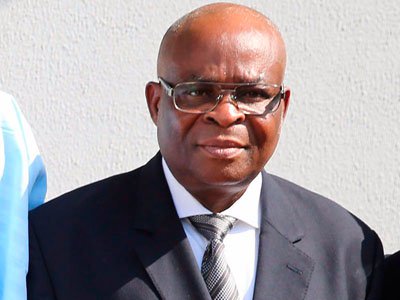News
ONNGHEN: CCT Rejects Court Orders Stopping CJN’s Trial

Eniola Olayemi
Code of Conduct Tribunal (CCT) held yesterday that it was not under any obligation to obey orders made by any High Court. Besides, it said that such courts, which are of equal status with it, lacked the powers to interfere with its proceedings.
The CCT said spoke in relation to four orders issued by the Federal High Court, the National Industrial Court and the High Court of the Federal Capital territory (FCT) restraining it from conducting further proceedings in relation to the non-declaration of assets charge pending against the Chief Justice of Nigeria (CJN), Justice Walter Onnoghen.
It expressed its view in a majority ruling delivered after entertaining arguments from lawyers to parties in the case against the CJN.
The arguments were on whether the tribunal could proceed with the hearing of the case despite the subsisting orders made by the High Court and the fact that the Court of Appeal has fixed a date to hear the CJN’s motion for stay of proceedings.
In a split decision of two members to one, the tribunal elected to discountenance the orders, on the grounds that they were made by courts of equal status with it and therefore not binding on it. It said it would proceed to hear pending applications, particularly the one challenging its jurisdiction.
In a majority decision, the tribunal Chairman, Danladi Umar and the third member of the three-member panel, Mrs. Julie Anabor, also refused the CJN’s request for indefinite adjournment.
The second member, William Agwadza Atedze, in a dissenting opinion, agreed with the CJN that, with the orders by the High courts and the appeal before the Court of Appeal, it was necessary for the CCT to adjourn indefinitely pending when the issue of jurisdiction was resolved.
At the commencement of yesterday’s proceedings, the lead prosecuting lawyer, Aliyu Umar (SAN) told the court that the business of the day was for the hearing of pending applications and the arraignment of the defendant.
Umar identified the applications as the one he filed, seeking an order to compel the CJN to step down from office pending the conclusion of his trial and the one filed by the defendant, which challenged the competence of the charge and the jurisdiction of the tribunal to hear it.
He said since the CJN was absent and could not be arraigned, the tribunal should take the pending applications, a request the lead defence lawyer, Wole Olanipekun (SAN), objected to and informed the court that there have been intervening factors that now prevent the tribunal from further proceeding to hear the case.
Olanipekun, who led a retinue of lawyers, including 46 SANs for the CJN, drew the tribunal’s attention to the four restraining orders granted against the CCT and others.
He said the orders were made in four cases filed before the Federal High Court in Abuja, the National Industrial Court in Abuja and the High Court of the FCT by some groups and an individual.
The orders include, the one made on January 14 this year in a suit marked: ABJ/CS/29/2029, filed by the Incorporated Trustees of Centre for Justice and Peace Initiative against the Attorney general of the Federation (AGF) and five others, including the CCT and its Chairman; the second also made on January 14 by the National Industrial Court in the suit marked; NICN/ABJ/07/19, filed by one Peter O. Abang against the AGF & six others.
The third order, Olanipekun said was given on January 15 by the High Court of the FCT in the suit marked: FCT/CV/CV/771/19 with Motion No: FCT/HC/M/2016/2019 in the suit filed by the Foundation for the Defence of Consumers’ Rights against the AGF and six others. He added that the fourth order was given on January 21 by another judge of the Federal High Court in Abuja in the suit by the Action People’s Party (APP) against the President of Nigeria and five others.
Olanipekun, who cited several judicial authorities and legal provisions, argued that the CCT could no longer proceed to hear the case in view of the existing four orders, stopping the tribunal from continuing to hear the case, and the fact that the Court of Appeal in Abuja has fixed a date to hear a motion in the appeal filed by the CJN seeking to stay further proceedings before the CCT.
He urged the tribunal to prevent the creation of a state of anarchy and chaos by respecting the orders and the hierarchy of courts by adjourning sine die (indefinitely) pending when all the cases and appeal are concluded.
Umar objected to Olanipekun’s request for an indefinite adjournment on the grounds of the orders from the High courts, which he argued, were not binding on the tribunal. He noted that the Court of Appeal did not make any order stopping proceedings before the tribunal.
On Olanipekun’s claim that the lawyer, who represented the AGF at the Monday’s proceedings at the Court of Appeal in Abuja undertook to abide by the orders, Umar said he was not aware of such undertaking.
Umar said the law empowers him to apply for a bench warrant against the CJN, who has continued to stay away from the tribunal despite being served with the charge.
He, however, said he was not willing to apply for the CJN’s arrest, but that he would ask the tribunal to make an interim order if it (the tribunal) was willing to accede to the request for indefinite adjournment. Umar was, however, silent on what he wants the interim order to be directed at.
After the lawyers’ argument, the tribunal rose for over one hour, and when it resumed sitting later, it was the Chiarman, Danladi Umar, who first read his lead ruling, which was supported by Mrs. Anabor.
Umar said: “The orders issued by the Federal High Court and the national Industrial Court are not binding on the tribunal. This is because the tribunal is established by the Constitution of the Federal Republic of Nigeria and under the Third Schedule to the Constitution, it is empowered to adjudicate on matters relating to assets declaration.
“The Code of Conduct Bureau (CCB), under the Third Schedule of the Constitution, is vested with powers to refer matters of breach of the code of conduct by public officers to the tribunal to the exclusion of any other court in Nigeria. It is therefore right to state that tribunal is empowered by the Constitution to adjudicate on matters referred to it by the CCB to the exclusion of any other court.”
He said in view of the provisions of the Constitution, “any order from the Federal High Court or the national industrial Court cannot stop the tribunal from continuing with the proceedings before it as the Constitution so empowered the tribunal to do so.”
The Constitution is the grundnorm and it is superior to any law or order of any court.”
He referred to the provisions of Part one of the Third Schedule to the Constitution, Section 143 of the Constitution and Paragraph 3(e) of the Code of Conduct Bureau and Tribunal Act (CCBTA) and stated that the CCT “has unqualified or original jurisdiction to determine breach of the code of conduct for public officers as referred to it by the CCB.”
Umar, who noted that the CCT runs coordinate to the Federal High Court and the National Industrial Court by virtue of the fact that appeals lie from both courts and the CCT to the Court of Appeal, said no superior court of record can give order to another court of record as they are of coordinate jurisdiction.
In further faulting the orders made by the High Courts, Umar noted that the orders were obtained by “busy bodies,” individuals and groups there are not parties in the case before the CCT.
“The orders by the Federal High Court and the NIC are hereby discountenanced as they are of no binding effect on the tribunal,” he said.
On the pendency of the motion before the Court of Appeal, he said Section 306 of the Administration of Criminal Justice Act (ACJA) states that application for stay of proceedings in criminal matters shall not be entertained. He noted that the CJN case before the CCT “is criminal in nature.”
Relying on the provision of Section 18(4) of the Code of Conduct Bureau and Tribunal Act and Section 246 (1)(a) of the Constitution, Umar said, since appeal from the decision of the CCT lies only to the Court of Appeal, it was only such appellate court that has the power to give order to the tribunal.
He said the tribunal would continue to hear the case and ordered the defendant to move its application challenging the tribunal’s jurisdiction.
In his dissenting opinion, Atedze agreed with Olanipekun that the order of court is binding until set aside, even if the order is a nullity.
He said by the provision of Section 287 (1) of the Constitution, the CCT was under the obligation to give effect to any order of court no matter how defective such order may be, until it is set aside.
Atedze said since the CCT is not operating in isolation, it must obey orders made by courts to prevent the creation of a state of anarchy.
He agreed to the request for an indefinite adjournment until the issue of the tribunal’s jurisdiction was resolved by the Court of Appeal.
After the ruling, Olanipekun said he could not move his application, as order in the majority opinion, because he needed time to read and respond to the prosecution’s response to his application, which he said was served on him late.
Olanipekun said he was entitled to two days. He reminded the tribunal that the parties would be before the Court of Appeal tomorrow. He asked that the case be adjourned to a later date.
It consequently adjourned to January 28 for the hearing of the CJN’s application, challenging the tribunal’s jurisdiction.
As proceedings were ongoing, before the tribunal, a crowd of placard-bearing men, women and youths gathered at the main entrance to the tribunal’s sitting venue.
Some hailed the trial; others urged the government to discontinue with it.
Those in support of the trial, acting under the group –“Our Nation First”, asked the CJN to step down. They argued that the sanctity of judiciary must be protected and should not be dragged in the mud because of the interest of a certain individual.
Another set of protesters under the banner of the “Coalition of United Political Party (CUPP) and of Advocate for Peoples’ Rights and Justice (APRJ)”, asked the government to stop the CJN’s trial as it was an attempt to subjugate the judiciary.






























